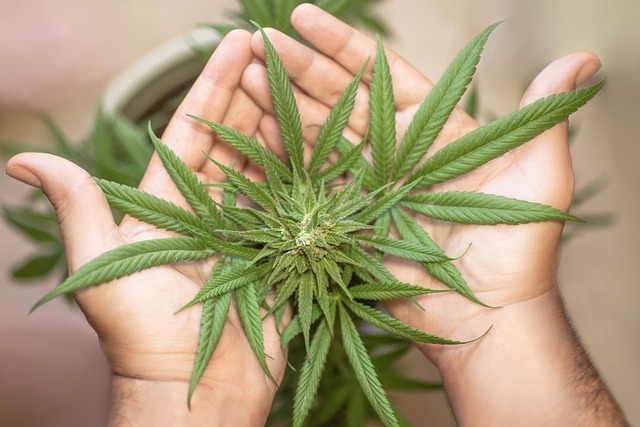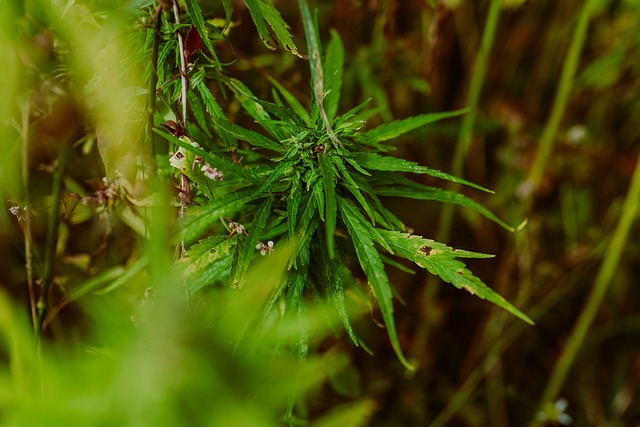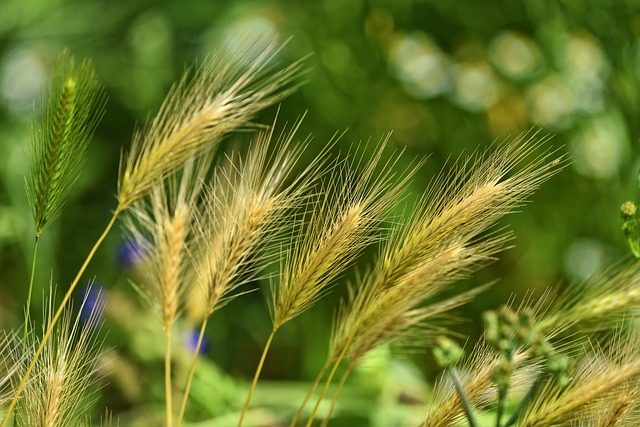The THCA flower, a non-psychoactive cannabinoid found in cannabis plants, has been identified for its potential to alleviate nausea, particularly in those undergoing chemotherapy or experiencing similar conditions. Studies show that THCA interacts with the endocannabinoid system's CB1 receptors to provide anti-nausea effects without the psychoactive side effects of THC. This makes it a promising therapeutic alternative for managing nausea, as it allows patients to maintain clear mental function during treatment. The anti-nausea efficacy of THCA is rooted in its ability to influence neurotransmitters involved in vomiting and emesis control. Its historical use across various cultures, coupled with recent scientific validation, positions THCA flower as a significant natural remedy for nausea. For those interested in exploring THCA flower for its anti-nausea properties, it is recommended to begin with modest doses, source high-quality products from reputable suppliers, and consult healthcare providers to ensure safe and effective use alongside other health regimens or medications. The 'start low and go slow' approach is key to maximizing the benefits of THCA flower while minimizing potential side effects, aiming for enhanced well-being and comfort in nausea management.
Exploring the therapeutic potential of THCA flower as a natural remedy for nausea, this article sheds light on its emerging role in alleviating discomfort. From scientific insights into its anti-nausea properties to historical uses and practical guidance for incorporation into treatment plans, we delve into the multifaceted benefits of THCA flower for those seeking alternatives to traditional medications. Join us as we examine how this plant-based solution compares to conventional anti-nausea methods and offer advice on optimizing its efficacy through proper strain selection and dosage understanding.
- Unveiling the Potential of THCA Flower in Alleviating Nausea
- The Science Behind THCA Flower's Anti-Nausea Properties
- Historical and Cultural Perspectives on THCA for Nausea Relief
- How to Safely Incorporate THCA Flower into Your Anti-Nausea Regimen
- Comparing THCA Flower's Efficacy Against Other Anti-Nausea Methods
- Understanding Dosage and the Right Strain for Maximizing Anti-Nausea Benefits from THCA Flower
Unveiling the Potential of THCA Flower in Alleviating Nausea

The THCA flower, a precursor to THC found in cannabis plants, has garnered attention for its potential therapeutic properties. Among these, the anti-nausea effects of THCA have been the subject of growing interest within the medical community. Research suggests that THCA interacts with the body’s endocannabinoid system, particularly the CB1 receptors responsible for regulating nausea and vomiting. This interaction can help alleviate symptoms in individuals suffering from chemotherapy-induced nausea or those experiencing nausea due to other conditions. Preclinical studies have indicated that THCA possesses anti-emetic properties, making it a promising alternative for managing nausea without the psychoactive effects associated with its decarboxylated form, THC. Furthermore, the non-psychoactive nature of THCA flower allows for broader applications and less potential for cognitive impairment, which is beneficial for patients who need to maintain clarity of mind during treatment. As such, the use of THCA flower as a natural remedy to combat nausea is an exciting development that merits further investigation to fully understand its potential in various therapeutic contexts.
The Science Behind THCA Flower's Anti-Nausea Properties

Research has elucidated the molecular mechanisms underlying the thca flower’s anti-nausea effects, which are primarily attributed to its interaction with the body’s endocannabinoid system. THCA, or tetrahydrocannabinolic acid, is a non-psychoactive cannabinoid found in the Cannabis sativa plant. It is believed that THCA interacts with the CB1 and CB2 receptors within the ECS, influencing the serotonin receptors which play a crucial role in gastrointestinal motility and the emetic reflex. This interaction can alleviate nausea by modulating these pathways, providing relief to those undergoing chemotherapy or suffering from other conditions that cause nausea.
Furthermore, preclinical studies have demonstrated that THCA possesses anti-emetic properties that are separate from its psychoactive counterpart, THC. These findings suggest that THCA may offer a viable therapeutic option for managing nausea without the psychoactive effects typically associated with cannabis use. The anti-nausea effects of THCA flower are promising and indicate potential for its inclusion in integrative treatment protocols for individuals experiencing chemotherapy-induced nausea or other nausea-related conditions. As research continues to evolve, the therapeutic applications of THCA may be further refined to optimize its anti-nausea benefits.
Historical and Cultural Perspectives on THCA for Nausea Relief

Historically, the therapeutic properties of cannabis have been recognized and utilized in various cultures for centuries. Within this rich tapestry of traditional use, the non-psychoactive compound tetrahydrocannabinolic acid (THCA) has garnered attention for its potential anti-nausea effects. Anthropological studies suggest that early civilizations employed cannabis preparations to alleviate symptoms of gastrointestinal distress, which often include nausea. The cultural legacy of using cannabis for wellness extends across continents, reflecting a common understanding of its benefits.
In recent years, scientific research has substantiated these historical claims, particularly with regard to THCA’s role in mitigating nausea. Studies have indicated that THCA, found abundantly in raw cannabis flowers, interacts with the body’s endocannabinoid system, influencing neurotransmitters that regulate emesis, or vomiting. This has significant implications for those seeking natural remedies for nausea, as THCA flower extracts and products have been shown to provide relief without the psychoactive side effects associated with its decarboxylated form, THC. The anti-nausea effects of THCA are being explored in various therapeutic contexts, offering a promising avenue for future research and application in nausea management.
How to Safely Incorporate THCA Flower into Your Anti-Nausea Regimen

Including THCA flower in an anti-nausea regimen can be a safe and effective approach for those seeking natural alternatives to manage nausea. THCA, or tetrahydrocannabinolic acid, is the raw form of THC found in hemp and cannabis plants. Unlike its psychoactive counterpart, THCA does not induce a high but has been reported to possess anti-nausea properties. When incorporating THCA flower into your routine, it’s crucial to start with a low dose to gauge your body’s response. THCA flower can be consumed in various ways, such as through vaporization, which allows for precise dosing and quick onset of effects, or by preparing it as tea, where the effects may take longer to manifest but last for an extended period.
For optimal safety and efficacy, it’s recommended to source high-quality THCA flower from reputable suppliers. The flower should be lab-tested to confirm its THC levels and purity. Users should also consult with a healthcare provider before integrating THCA flower into their anti-nausea regimen, especially if they are taking other medications or have underlying health conditions. Proper dosing cannot be overstated; it’s essential to follow the ‘start low and go slow’ principle. This approach ensures that you experience the full range of benefits from the THCA flower anti-nausea effects without overwhelming your system, thereby enhancing your overall well-being and comfort.
Comparing THCA Flower's Efficacy Against Other Anti-Nausea Methods

The THCA flower, which contains the non-psychoactive cannabinoid tetrahydrocannabinolic acid A (THCA), has garnered attention for its potential anti-nausea effects. Studies suggest that THCA interacts with the body’s endocannabinoid system, particularly the CB1 receptors responsible for regulating nausea and vomiting. This interaction may offer a natural and effective alternative to traditional pharmaceutical treatments for nausea, which often come with a range of side effects. Unlike certain conventional anti-nausea medications that can be ineffective or have limited efficacy for some individuals, the THCA flower has been reported to provide significant relief for those experiencing chemotherapy-induced nausea. The therapeutic potential of THCA is rooted in its ability to activate these receptors without the psychoactive effects associated with delta-9-THC, making it a compelling option for those seeking relief from nausea during treatments like chemotherapy or for conditions that cause chronic nausea.
Furthermore, the anti-nausea effects of THCA flower are being compared favorably against other methods within the holistic health community. Unlike synthetic drugs that can sometimes exacerbate gastrointestinal issues or require careful dosing to avoid unwanted symptoms, the THCA flower offers a more nuanced approach. Users often report a sense of well-being alongside the alleviation of nausea, attributing this to the entourage effect provided by the full spectrum of cannabinoids and terpenes present in the flower. This synergistic interaction may enhance the anti-nausea benefits, offering a comprehensive solution that addresses not just the symptom but also improves overall comfort and quality of life for those undergoing treatment or dealing with chronic conditions.
Understanding Dosage and the Right Strain for Maximizing Anti-Nausea Benefits from THCA Flower

When exploring the potential anti-nausea effects of THCA flower, a non-psychoactive cannabinoid found in hemp and cannabis plants, understanding dosage and selecting the appropriate strain are crucial factors for maximizing its benefits. THCA, or tetrahydrocannabinolic acid, is known for its therapeutic properties, which may include alleviating nausea. To harness these effects, it’s essential to approach THCA flower with a measured dosage strategy. Beginners should start with small quantities and gradually increase the amount as needed, while also closely monitoring their body’s response. The right strain can further enhance the anti-nausea effects of THCA. Strains rich in THCA, such as those with high concentrations of ACDC or Harlequin, are often recommended for their calming and clarifying effects without intoxication. These strains can provide a more focused relief from nausea, making them suitable for daytime use or for individuals sensitive to psychoactive effects. Consistency in dosing and strain selection can contribute to a stable therapeutic experience, which is key to effectively managing symptoms of nausea. Always consult with a healthcare professional when incorporating THCA flower into your wellness regimen, especially if you have existing health conditions or are taking other medications.
THCA flower’s potential as a natural remedy for alleviating nausea has been thoroughly explored in this article, illuminating its anti-nausea effects. The scientific research underscores the efficacy of THCA flower, offering insights into its mechanisms and how it compares favorably to conventional treatments. By delving into historical and cultural uses, we’ve seen that its application for nausea relief is not new but has been revered in various traditions. Guidance on integrating THCA flower into an anti-nausea regimen ensures a safe approach to harnessing its benefits. In light of the evidence presented, it’s clear that THCA flower holds promise as a valuable addition to strategies aimed at combating nausea, with the added advantage of exploring different strains and dosages for optimal results.
